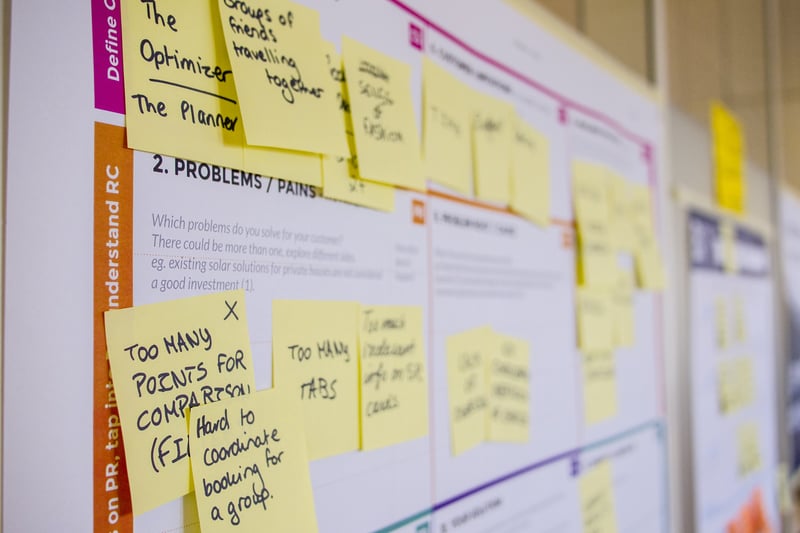What made me transition from Digital Marketer to UX Designer?
Introduction
It’s been a rough few weeks and we are surrounded by the ongoing uncertainty. I’ve recently been saying to others “Stay safe and healthy” more than “How are you”. During this hard time, all we can do is what we can control and take a step back to reflect on what we have been missing while we rushed through our lives.
Since I have turned my career path into a UX Designer, I have been meaning to highlight the benefits that UX design can offer to businesses, compared to traditional marketing, based on ten years of my journey from Digital Advertising industry into UX Design and why we should now focus more to enhance user experience and get it right.
Since ‘social media’ was introduced, we started to create our personal space on the internet and share with others. As a result, the trend levelled the playing field and opened up the era of ‘personal media’ where consumers play a marketer’s role, which is the biggest change we experienced in the mid-2010s.
But social media can only take us so far. As the importance of consumer marketer’s role has become more vital, the focus has shifted to where consumer and user experience happens along the entire life cycle of product and services. As the Customer lifecycle with when marketing and UX Design is involved by Nura Lim, 2020 map shows, UX Design can still have an impact on customer journey even when advertising was finished delivering messages – and it touches pretty much every point.

Image: Photo by Daria Nepriakhina on Unsplash
You can see how it works through this example of how Marketing and UX Design plays differently even when you purchase a laptop.
The point it tells you is that marketing and advertising will always cost business. But when UX Experience is well established throughout the customer lifecycle, the cost will be less, but the impact will be continuous because the focus of UX Design is building the core value of the business based on the actual users’ needs.
The UX Design process generally includes the five key steps and it can all be done remotely.
1. Review the business
Engage with stakeholders, review business key data resources
2. Recruitment and Research Facilitation
Qualitative research such as user interviews.
3. Synthesis and Findings
Find key insights based on the research and build personas as well as key user journey
4. Design and Testing
Mobile App/Website/Tablet designs using design tools such as Adobe XD
5. Visual Design Finalisation and Artefact Delivery
High-fidelity design with visual styling
During this time, decisions that businesses make is critical than ever before. But if we know what’s essential for business in the long run, I believe we can focus more on it, and go through this together wisely. Hope you all stay well and healthy.
Introduction
It’s been a rough few weeks and we are surrounded by the ongoing uncertainty. I’ve recently been saying to others “Stay safe and healthy” more than “How are you”. During this hard time, all we can do is what we can control and take a step back to reflect on what we have been missing while we rushed through our lives.
Since I have turned my career path into a UX Designer, I have been meaning to highlight the benefits that UX design can offer to businesses, compared to traditional marketing, based on ten years of my journey from Digital Advertising industry into UX Design and why we should now focus more to enhance user experience and get it right.
Since ‘social media’ was introduced, we started to create our personal space on the internet and share with others. As a result, the trend levelled the playing field and opened up the era of ‘personal media’ where consumers play a marketer’s role, which is the biggest change we experienced in the mid-2010s.
But social media can only take us so far. As the importance of consumer marketer’s role has become more vital, the focus has shifted to where consumer and user experience happens along the entire life cycle of product and services. As the Customer lifecycle with when marketing and UX Design is involved by Nura Lim, 2020 map shows, UX Design can still have an impact on customer journey even when advertising was finished delivering messages – and it touches pretty much every point.

Image: Photo by Daria Nepriakhina on Unsplash
You can see how it works through this example of how Marketing and UX Design plays differently even when you purchase a laptop.
The point it tells you is that marketing and advertising will always cost business. But when UX Experience is well established throughout the customer lifecycle, the cost will be less, but the impact will be continuous because the focus of UX Design is building the core value of the business based on the actual users’ needs.
The UX Design process generally includes the five key steps and it can all be done remotely.
1. Review the business
Engage with stakeholders, review business key data resources
2. Recruitment and Research Facilitation
Qualitative research such as user interviews.
3. Synthesis and Findings
Find key insights based on the research and build personas as well as key user journey
4. Design and Testing
Mobile App/Website/Tablet designs using design tools such as Adobe XD
5. Visual Design Finalisation and Artefact Delivery
High-fidelity design with visual styling
During this time, decisions that businesses make is critical than ever before. But if we know what’s essential for business in the long run, I believe we can focus more on it, and go through this together wisely. Hope you all stay well and healthy.